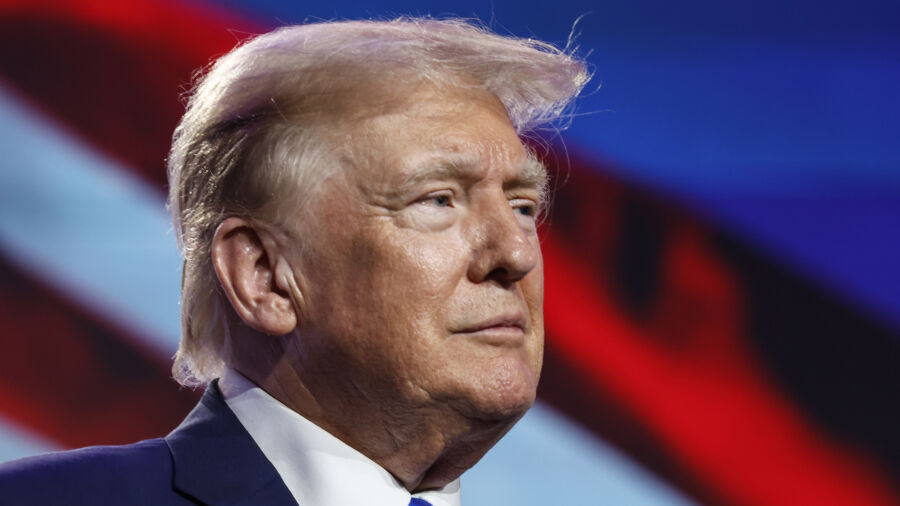Former President Donald Trump voiced support for a government shutdown if members of Congress can not come to a deal to help mitigate the nation’s $35 trillion debt in a interview with Kristen Welker on NBC’s “Meet the Press.”
“I think if they don’t get a fair deal—we have to save our country. We’re at $35 trillion in debt, we have to save our country,” he said. “I’d shut down the government if they can’t make an appropriate deal, absolutely.”
Ms. Welker had pressed the former president on whether “Republican hardliners should abandon their threat” of a government shutdown now that an impeachment inquiry was on the table. He rejected the idea.
The record debt led to Congress voting earlier this year to raise the debt ceiling after a months-long stalemate, approving legislation backed by President Joe Biden in order to avoid the nation’s first ever default.
Now Congress faces an appropriations battle, and must approve 11 more major spending bills by Sept. 30. Should members of the House and Senate not come to agreement on any of the 11 bills, the government would technically be forced to shut down. Congress would need to proceed at an average pace of more than one approval per working day in order to meet the deadline.
Impeachment Inquiry
The decision by House Speaker Kevin McCarthy (R-Calif.) to open an impeachment inquiry in the midst of a potential shutdown has been deemed risky and contentious, as Republicans are not all of one mind when it comes to the appropriations bills.
A small group of Republicans have long pushed for impeachment of the president, filing articles as early as 2021. But Mr. McCarthy has only recently begun to address it.
“The American people deserve to be heard on this matter through their elected representatives,” he said on Sept. 1. “That’s why, if we move forward with an impeachment inquiry, it would occur through a vote on the floor of the People’s House and not through a declaration by one person.”
Some see his recent openness to bringing forth an impeachment inquiry as a concession made in advance of difficult spending bill negotiations.
However, House Freedom Caucus members have remained adamant in their demand for spending cuts, with some even threatening to remove Mr. McCarthy from his leadership position if he continues to concede to Democrat spending demands.
Contentious Issues
House Republicans have included a provision in the spending bills that the Democrat-led Senate has not, seeking to bar funds from being used in any way to support any “discriminatory action” against someone for their religious belief or moral conviction that “marriage is, or should be recognized as, a union or one man and one woman.”
The lawmakers are also expected to clash on new funds allocated to Ukraine and border security funding.
Biden’s Response
President Joe Biden has criticized the idea of spending cuts and the threat of a government shutdown.
During a Sept. 14 speech in Maryland, he said, “Their plan—MAGAnomics—is more extreme than anything Americans have seen before,” criticizing his predecessor’s handling of the economy.
He claimed that his plan to allow Medicare to lower prescription drug costs has lowered the deficit, and that he will seek to further lower the deficit through taxes on big corporations.
Trump’s Government Shutdown
Lawmakers who did not want to provide $5 billion in funding for President Trump’s border wall got into a standoff with the president in December 2018 that resulted in a record government shutdown that lasted for weeks.
After 34 days, the president made a concession so that federal workers could get paid, and said he would declare a national emergency should negotiations in Congress continue to fail.
Congress eventually delivered a Homeland Security bill that included $1.3 billion in border wall funding, and the president declared a national emergency that allowed $3.5 billion of the Defense construction budget to be routed toward construction of the wall.
During his term, there were two other brief shutdowns. In January 2018, a shutdown occurred over a weekend after disputes over extending Deferred Action for Childhood Arrivals (DACA). A federal judge recently ruled DACA illegal, writing that no action was recommended against those who have already benefited from the program, but that no new additions to the program should take place.
In February 2018, just a month later, the government was partially shutdown for one day over immigration funding again as they debated the budget.
From The Epoch Times

